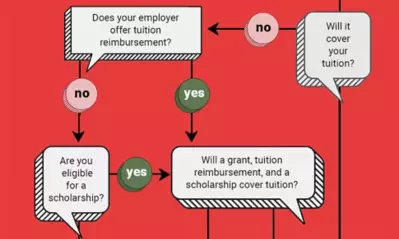What is a health savings account (HSA)?

Written by Elizabeth Exline

Reviewed by Chris Conway, Director of Financial Education Initiatives and Repayment Management

Starting a new job brings with it all sorts of exciting beginnings. There are new opportunities, new co-workers, new perks. There are also new decisions, and depending on your employer, one might be the possibility of a health savings account (HSA).
Do you wonder why people contribute to an HSA? Most people have healthcare expenses after all, and setting aside money makes sense. HSA funds offer a way to set aside pretax dollars toward eligible medical expenses. While it is important that you should consult with a tax advisor to make an informed decision, here’s some information to help you better understand health savings accounts.
What is a health savings account?
HSAs as a health insurance option didn’t exist until the early aughts, when then-president George W. Bush signed into law the Medicare Prescription Drug Improvement and Modernization Act of 2003.
Perhaps the easiest way to describe a health savings account is it is like a personal savings account. The account allows you to set aside pretax dollars from your paycheck to pay for eligible healthcare expenses.
From the beginning, HSAs have been linked to high-deductible health plans (HDHPs) or consumer-driven health plans (CDHPs), which is a fancy way of referring to health insurance plans in which members have to pay a deductible before the healthcare plan pays according to the coinsurance.
Essentially, a health savings account is a benefit offered by some employers that lets you set aside pretax dollars for qualified healthcare expenses like deductibles, copays, coinsurance, dental, vision, prescription drugs and more.
Because contributions are tax-free and therefore deducted from your paycheck before taxes, they reduce your gross annual income, which could also affect your income tax liability. Plus, interest and investment earnings are never taxed. Taxes are also not applied for withdrawals for eligible medical expenses.
What it's not: A flexible spending account (FSA)
The FSA and HSA have a few features in common. Both are tax-free accounts offered by some employers to cover eligible health expenses. Both can welcome contributions from employers, should they offer that.
But FSAs, which are flexible spending accounts, have a few key distinctions.
- FSAs are employer-sponsored and -owned, meaning if you leave your job, the FSA — and any funds in it — stay with the job.
- The IRS establishes the maximum salary deferral for contributions. However, employers may set a lower contribution amount.
- Funds in an FSA have to be used before the end of the plan year, or they get forfeited. There are exceptions: Some employers allow employees to roll over up to $500 to the next plan year. Others might allow a grace period to spend the balance.
Know the parameters
Health savings accounts enable you to save money to use for qualifying medical expenses. Available funds in an HSA will earn interest, tax-free. Also, similar to a 401(k), you can invest your fund, which means your money can grow beyond what you invest.
Unlike 401(k) accounts, though, HSA withdrawals are not taxed — unless you use the money for an unqualified expense before you’re 65. In that case, not only is it taxed, it’s also subject to a 20% penalty.
(If you withdraw the money for a non-medical expense after you turn 65, however, it will still be taxed as income, but there’s no penalty fee.)
Contribution caps are another difference between FSAs and HSAs. With FSAs, employers set the maximum limit; with HSAs, the IRS establishes the minimums and maximums.
For 2022, for example, those who meet the HDHP threshold can contribute up to:
- $3,650 for self-only coverage in an HSA
- $7,300 for family coverage in an HSA
Wondering about that HDHP threshold? That can change each year too. For 2022, health plans with a minimum deductible of $1,400 (individual) or $2,800 (family) are considered HDHPs whose subscribers are eligible to contribute to an HSA.
Other key characteristics of an HSA are:
- Employers can contribute to your HSA, but they don’t own it. That means the money you save goes with you, even if you change jobs.
- No employer? No problem. Individuals can open their own HSAs, even if they’re self-employed or their employers don’t offer the benefit.
- The money you don’t use in your HSA gets rolled over to the next year, so you never forfeit it and can be used for future healthcare expenses.
Qualified medical expenses
What you contribute to an HSA might be offset by your qualified medical expenses. In addition to somewhat obvious bills, like copays, prescription eyeglasses, hearing aids, lab work and medical prescriptions, HSA funds can cover other qualified medical expenses, such as:
- Acupuncture
- Birth control
- Chiropractor services
- Medical supplies
- Orthodontia
- Therapy
- Smoking-cessation programs
To see a complete list of eligible and noneligible expenses, review the Internal Revenue Service’s Publication 502.
FAQs
What's the difference between an FSA and an HSA?
An HSA does not expire and it belongs to the individual who opens the account. Funds roll over year over year and can be used for future healthcare expenses. HSA offers triple tax savings as contributions are pretax, interest and capital gains on investments are tax-free, and withdrawals for qualified medical expenses are tax-free, although state taxes may apply.
An FSA is also a tax-advantaged account whose funds can be used for eligible healthcare expenses but are not invested. An FSA belongs to the employer and annual contributions are use them or lose them, so you must incur claims during the plan year to use any available funds. If not, the funds are forfeited at the end of the plan year.
What are the requirements to open a health savings account?
To have an HSA, you must be enrolled in a high-deductible health plan (HDHP) or consumer-driven health plans (CDHP), which means you must first pay a deductible for qualified medical expenses before your health plan coinsurance applies. HDHPs and CDHPs are available through the Affordable Care Act as well as through private insurance.
At age 55 you can contribute an additional $1,000 as a catch-up contribution. Once you are enrolled in Medicare you can no longer contribute to an HSA; however, you can continue to withdraw funds to cover eligible healthcare expenses and use funds to pay Medicare premiums.
Can I contribute to an HSA if my health plan has a low deductible?
No. Only individuals who are enrolled in HDHPs or CDHPs are eligible to contribute to HSAs.
Can I contribute to both an HSA and an FSA in the same year?
Yes, you can contribute to a limited-purpose FSA to cover dental and vision expenses. You cannot contribute to a healthcare FSA and HSA at the same time.

ABOUT THE AUTHOR
Elizabeth Exline has been telling stories ever since she won a writing contest in third grade. She's covered design and architecture, travel, lifestyle content and a host of other topics for national, regional, local and brand publications. Additionally, she's worked in content development for Marriott International and manuscript development for a variety of authors.

ABOUT THE REVIEWER
As Director of Financial Education Initiatives and Repayment Management, Chris Conway works with departments across the University to provide resources that allow students to make more informed financial decisions. She is also an adjunct faculty member for the Everyday Finance and Economics course at the University, and she chairs the National Council of Higher Education Resources College Access and Success Committee. Conway is committed to helping college students make the right financial decisions that prevent future collection activity.
This article has been vetted by University of Phoenix's editorial advisory committee.
Read more about our editorial process.
Read more articles like this:


